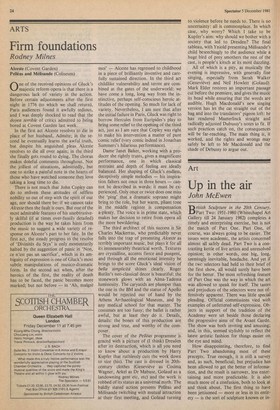ARTS
Firm foundations
Rodney Mines Alceste (Covent Garden) Pe'leas and Melisande (Coliseum) One of the received opinions of Gluck's majestic reform opera is that there is a dangerous lack of variety in the action. Before certain adjustments after the first night in 1776 (to which we shall return), Paris audiences found it awfully tedious, and I was deeply shocked to read that the doyen terrible of critics admitted to being bored at Covent Garden last week.
In the first act Alceste resolves to die in place of her husband, Admete; in the second he eventually learns the awful truth, but despite his anguished pleas Alceste resolves to die all over again; in the third she finally gets round to dying. The chorus makes doleful comments throughout. Not the jolliest of situations, admittedly, but one to strike a painful note in the hearts of those who have watched someone they love taking a long time to die.
There is not much that John Copley can do to enliven these attitudes of selfless nobility so out of step with the spirit of our age, nor should there be: if we cannot take Alceste then the fault is ours. But one of the most admirable features of his unobtrusively skilful (if at times over-fussily detailed) production is the way he takes hints from the music to suggest a wide variety of response on Alceste's part to her fate. In the first act, the steady progress to the resolve of `Divinites du Styx' is only momentarily halted by the suggestion of panic in 'Non, ce n'est pas un sacrifice', which in its ambiguity of expression is one of Gluck's most subtle manipulations of musico-dramatic form. In the second act when, after the heroics of the first, the reality of death has to be faced, the panic becomes more marked; but not before — in `Ah, malgre moi' — Alceste has regressed to childhood in a piece of brilliantly inventive and carefully sustained direction. In the third act childlike vulnerability and terror are combined at the gates of the underworld: we have come a long, long way from the instinctive, perhaps self-conscious heroic attitudes of the opening. So much for lack of variety. Nevertheless, I am sure that after the initial failure in Paris, Gluck was right to borrow Hercules from Euripides's play to bring some relief to the opening of the third act, just as I am sure that Copley was right to make his intervention a matter of pure comic relief (very comic indeed in Jonathan Summers's hilarious performance).
Dame'Janet Baker, working with a producer she rightly trusts, gives a magnificent performance, one in which classical restraint and depth of feeling are ideally balanced. Her shaping of Gluck's endless, deceptively simple melodies — his inspiration falters not once in three hours — cannot be described in words: it must be experienced. Only once or twice does one miss the 'ping' that a dramatic soprano might bring to the role, but her warm, pliant tone in the middle register is compensation a-plenty. The voice is in prime state, which makes her decision to retire from opera all the more bewildering.
The third architect of this success is Sir Charles Mackerras, who predictably never falls into the trap of presenting Alceste as terribly important music, but plays it for all its immeasurably theatrical worth. Textures are crystalline, accents fierce and pungent, and through all the emotional intensity he brings to the score Gluck's ideal vision of be/la simplicitet shines clearly. Roger Butlin's neo-classical decor is beautiful: the stonework glows with an Alma-Tadema luminosity. The caryatids are plumper than the one in the BM and the statue of Apollo would be rejected out of hand by the Athens Archaeological Museum, and by any medical school for that matter. The costumes are too fussy; the ballet is rather awful, but at least they do it. Details, details: the bones of this production are strong and true, and worthy of the composer.
The cover of the Pefleas programme is graced with a picture of (I think) Dresden after its destruction, which is all you need to know about a production by Harry Kupfer that ruthlessly cuts the work down to size (his). The cast is dressed in 20thcentury clothes (Genevieve as Cosima Wagner, Arkel as Dr Mabuse, Golaud as a landowning gent etc, etc) and the work is robbed of its status as a universal myth. The baldly stated action presents Pelleas and Melisande twitching with mutual attraction at their first meeting, and Golaud turning to violence before he needs to. There is no uncertainty: all is commonplace. In which case, why worry? Which I take to be Kupfer's aim: why should we bother with a society that led to Dresden? The final tableau, with Yniold presenting Melisande's child beseechingly to the audience while a huge bird of prey smothers the rest of the cast, is people's kitsch at its most dazzling.
All of which is a pity, as musically the evening is impressive, with generally fine singing, especially from Sarah Walker (Genevieve) and Neil Howlett (Golaud). Mark Elder restores an important passage cut before the premiere, and gives the music its head while ensuring that the words are audible. Hugh Macdonald's new singing version has let the cat straight out of the bag and into the translators' pigeon loft: he has rendered Maeterlinck straight and radically adjusted Dubussy's notes to fit. If such practices catch on, the consequences will be far-reaching. The main thing is, it worked, and the rights and wrongs may safely be left to Mr Macdonald and the shade of Debussy to argue out.










































 Previous page
Previous page